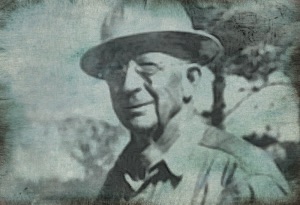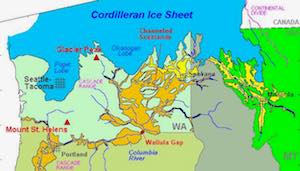A Flood of Ideas

J Harlen Bretz, 1949
Geologists have a tendency to get really worked up about flood-related theories. Early in the history of the science, the Biblical flood provided the foundation for most every claim, and we approached all of geology in that context.
Evidence built up over time until it forced the geological community to acknowledge that nothing of the sort had happened. In fact, they went so far as to construct a doctrine called uniformitarianism, which claimed that all past geological processes are the same as the ones operating now.
Then, in 1920, a geologist named J Harlen Bretz developed a new set of flood theory that would shake things up all over again.
Bretz's research and field work led him to propose a series of absolutely catastrophic floods in the Pacific Northwest. I won't go into all the various iterations of the idea over the years, but the floods as we understand them now are far more destructive than almost any other geological events today.

The Cordilleran
During the ice ages, the Cordilleran continental ice sheet dwarfed any glacier existing today. It and its several sibling glaciers around the world held enough ice to lower the sea levels by hundreds of feet. As the temperature gradually increased, however, a massive lake, around the size of one of the Great Lakes, began to melt into the top of the ice sheet, somewhere in Western Montana.
Over time, cracks began to grow in the massive ice dam holding the lake in, until it finally shattered, releasing all the water at once. The floodwaters would have moved between 45 and 60 miles per hour, cresting at over 400 feet tall in the Columbia River Gorge and the Willamette River Valley.

McCoy Fields, 2017
Flood waters carried enormous boulders as though they were twigs, deforming entire landscapes. The debris from the flood flowed hundreds of miles through Idaho and Oregon, and from there well into the Pacific Ocean.
Oh, and there wasn't just a single flood. The ice sheet eventually formed a new lake and the cycle repeated itself as many as forty times. This all took place well before any humans arrived in North America.
The geological establishment resisted Bretz’s ideas for years, but Bretz and his allies eventually won the day in a crushing victory. Decades later, Bretz complained that he no longer had any enemies to gloat over.
_________
Quotable
Yes, Yard Ramp Guy: Now, here’s a quotation:
“Nature gave men two ends -- one to sit on, and one to think with. Ever since then man's success or failure has been dependent on the one he used most.”